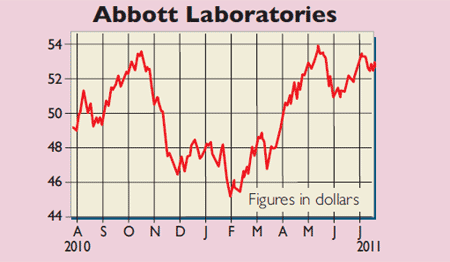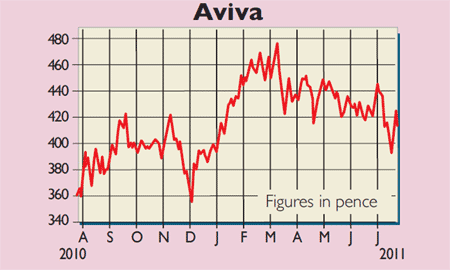Get the latest financial news, insights and expert analysis from our award-winning MoneyWeek team, to help you understand what really matters when it comes to your finances.
You are now subscribed
Your newsletter sign-up was successful
Want to add more newsletters?

Twice daily
MoneyWeek
Get the latest financial news, insights and expert analysis from our award-winning MoneyWeek team, to help you understand what really matters when it comes to your finances.

Four times a week
Look After My Bills
Sign up to our free money-saving newsletter, filled with the latest news and expert advice to help you find the best tips and deals for managing your bills. Start saving today!
1. Abbott Laboratories (NYSE: ABT), rated OUTPERFORM by RBC, Capital Markets
It seemed churlish for shares in Abbott Labs to have been marked down after reporting its second-quarter figures last Wednesday. I think there's plenty to cheer about.
This US drug and medical device maker lifted sales by 9% and profits by 11%, driven by strong performances from emerging markets and its best-selling product Humira (20% of revenues). The latter is a blockbuster drug, used to treat autoimmune disorders such as psoriasis, arthritis and Crohn's, generating annual sales of about $7.5bn.
MoneyWeek
Subscribe to MoneyWeek today and get your first six magazine issues absolutely FREE

Sign up to Money Morning
Don't miss the latest investment and personal finances news, market analysis, plus money-saving tips with our free twice-daily newsletter
Don't miss the latest investment and personal finances news, market analysis, plus money-saving tips with our free twice-daily newsletter
What seems to be holding back sentiment is the overblown concern about a rival treatment, tofacitinib. This is an oral medicine for rheumatoid arthritis that Pfizer is developing, which will probably be cheaper and more convenient to take. Yet tofacitinib won't hit the market for the next two years, assuming further trials go well. Even if it achieves its target of $1bn sales by 2015, it would cannibalise not just Humira, but also rival products from Johnson & Johnson and Amgen, suggesting less than a $0.5bn (or 7%) hit to the top line.

Another inflated worry is that Humira will start losing patent protection in 2016. By then, there should be plenty of exciting products in Abbott's pipeline. For example, there's bardoxolone, which treats chronic kidney disease in type 2 diabetes patients. People worldwide are eating more and exercising less causing more diabetes and kidney failure. So far, clinical data has shown bardoxolone not only slows the condition, with 90% of patients improving, but also reverses the disease's progression. Other late-stage compounds include daclizumab for multiple sclerosis, Duodopa for advanced Parkinson's and elotuzumab for multiple myeloma, a type of blood cancer. While there will be the odd setback, each of these has the chance to be a blockbuster in the next five years.
But this is only part of the story. Twenty-six per cent of Abbott's revenue is derived from emerging markets such as India, Russia and China. In particular, it is the leader in India (7% share) after it acquired Piramal Healthcare's domestic formulation business in May 2010. This is important because the country has a 1.2 billion population, and its healthcare market is predicted to soar from $12.6bn to $55bn by 2020. On the cost front too, the firm is running a tight ship it recently eliminated 1,900 positions, or 2% of its work force.
There have only been two slight recent blips. One is quality problems, resulting in recent recalls of its diabetes test strips and Similac baby formula. The other is its cholesterol drug Niaspan, where sales ($900m) are likely to decline "a bit" in the wake of evidence that it has no benefit for certain heart patients. Overall, though, the chief executive, Thomas Freyman, is in bullish mood. He said the company isn't being significantly affected by fewer patient procedures or the sluggish economy. That's allowed the board to raise its 2011 earnings guidance by 4 cents to between $4.58 and $4.68 per share.
So how much is Abbott worth now? I value the group on a ten times earnings before interest, tax, depreciation and amortisation (EBITDA) multiple, adjusting for net debt of $10bn and a $7.2bn pension deficit that generates an intrinsic value of about $62 a share. As for potential pitfalls, the successful integration of recent acquisitions is a priority, while Abbott (like its peers) is also exposed to patent challenges, increasing regulatory scrutiny and tighter government spend.
All the same, offering a 3.5% dividend yield and a cabinet stuffed full of innovative new compounds, the stock looks just the medicine for a defensive portfolio. RBC Capital Markets has a target price of $60 a share.
Recommendation: BUY at $53
2. Aviva (LSE: AV), rated a BUY by Jefferies
Low interest rates may be a boon if you have a mortgage but they are a disaster for savers. One solution is dividend-paying stocks such as Aviva's, which offer a 6.2% yield (twice covered). It is Britain's second-largest insurer, providing a mix of life, housing, car and general insurance to millions of customers across Europe, North America and Asia.
Under the astute leadership of the chief executive, Andrew Moss, the group is currently in the middle of a major strategic overhaul as it looks to divest non-core units. It will focus on 12 out of the 30 countries in which it operates. In April, Aviva trimmed its 58% stake in Benelux operator Delta Lloyd to 43%. This was clever because not only did it net £381m, it also reduced its exposure to Delta's sizeable corporate bond and loan book. That makes it less vulnerable to future credit risk, especially if the eurozone hits another debt crisis.

Next for the chop was roadside assistance provider RAC in June, sold to asset manager Carlyle for £1bn on a hefty 17 times 2010 earnings. That's a great valuation, as it generated a £600m profit from a business it only owned for five years. The proceeds will be used to boost the group's surplus (over minimum regulatory reserves) to around £3.5bn. Once completed in the third quarter, these two transactions should deliver a proforma net asset value of about 465p a share. Also, there are rumours that rival Allianz could be about to pay a hefty premium for Aviva's US arm. The firm is also on track to deliver £400m per year of cost savings by 2012 and produce £1.5bn in cash in 2011. It will further deleverage by cutting its hybrid debt by £700m over three years.
So what could go wrong? Well, Aviva has some 40% of its capital in euros. So the Continent's sovereign debt crisis is unwelcome. However, its holdings of Greek, Irish and Portuguese bonds only represent 3% of its market-consistent embedded value of 576p a share. Moreover, a 40% fall in equity markets would only reduce its solvency surplus by £0.6bn, so its balance sheet is strong. The group is also exposed to the usual industry fears of volatile investment returns, lengthening life expectancies, counter-party risk and the forthcoming proposals to increase capital requirements under Europe's Solvency II rules.
Nonetheless, Aviva is a much respected franchise. I value the stock on my estimated December net asset value of around 480p a share. Jefferies has a target price of 512p, and interims are scheduled for 4 August.
Recommendation: BUY at 396p
Get the latest financial news, insights and expert analysis from our award-winning MoneyWeek team, to help you understand what really matters when it comes to your finances.
Paul gained a degree in electrical engineering and went on to qualify as a chartered management accountant. He has extensive corporate finance and investment experience and is a member of the Securities Institute.
Over the past 16 years Paul has held top-level financial management and M&A roles for blue-chip companies such as O2, GKN and Unilever. He is now director of his own capital investment and consultancy firm, PMH Capital Limited.
Paul is an expert at analysing companies in new, fast-growing markets, and is an extremely shrewd stock-picker.
-
 8 ways the ‘sandwich generation’ can protect wealth
8 ways the ‘sandwich generation’ can protect wealthPeople squeezed between caring for ageing parents and adult children or younger grandchildren – known as the ‘sandwich generation’ – are at risk of neglecting their own financial planning. Here’s how to protect yourself and your loved ones’ wealth.
-
 What are Avios-only flights and who is eligible?
What are Avios-only flights and who is eligible?Avios-only flights have proved incredibly popular since launching in 2023. We explain what they are, how they work and who qualifies